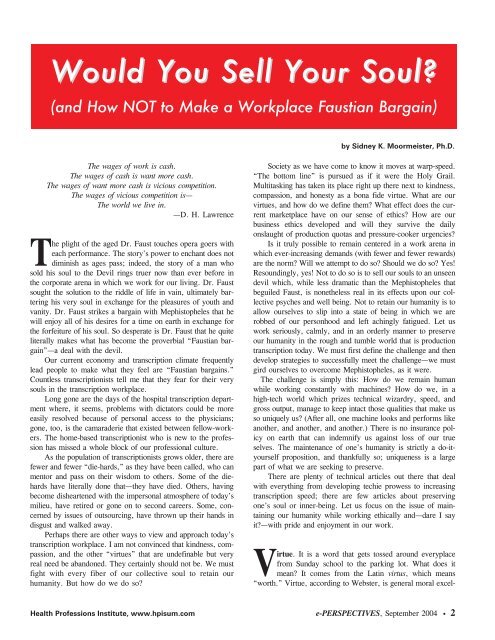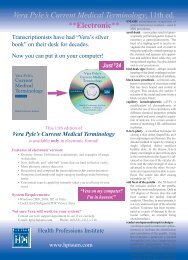on the Medical Transcription Profession - Health Professions Institute
on the Medical Transcription Profession - Health Professions Institute
on the Medical Transcription Profession - Health Professions Institute
Create successful ePaper yourself
Turn your PDF publications into a flip-book with our unique Google optimized e-Paper software.
Would You Sell Your Soul?<br />
(and How NOT to Make a Workplace Faustian Bargain)<br />
The wages of work is cash.<br />
The wages of cash is want more cash.<br />
The wages of want more cash is vicious competiti<strong>on</strong>.<br />
The wages of vicious competiti<strong>on</strong> is—<br />
The world we live in.<br />
—D. H. Lawrence<br />
The plight of <strong>the</strong> aged Dr. Faust touches opera goers with<br />
each performance. The story’s power to enchant does not<br />
diminish as ages pass; indeed, <strong>the</strong> story of a man who<br />
sold his soul to <strong>the</strong> Devil rings truer now than ever before in<br />
<strong>the</strong> corporate arena in which we work for our living. Dr. Faust<br />
sought <strong>the</strong> soluti<strong>on</strong> to <strong>the</strong> riddle of life in vain, ultimately bartering<br />
his very soul in exchange for <strong>the</strong> pleasures of youth and<br />
vanity. Dr. Faust strikes a bargain with Mephistopheles that he<br />
will enjoy all of his desires for a time <strong>on</strong> earth in exchange for<br />
<strong>the</strong> forfeiture of his soul. So desperate is Dr. Faust that he quite<br />
literally makes what has become <strong>the</strong> proverbial “Faustian bargain”—a<br />
deal with <strong>the</strong> devil.<br />
Our current ec<strong>on</strong>omy and transcripti<strong>on</strong> climate frequently<br />
lead people to make what <strong>the</strong>y feel are “Faustian bargains.”<br />
Countless transcripti<strong>on</strong>ists tell me that <strong>the</strong>y fear for <strong>the</strong>ir very<br />
souls in <strong>the</strong> transcripti<strong>on</strong> workplace.<br />
L<strong>on</strong>g g<strong>on</strong>e are <strong>the</strong> days of <strong>the</strong> hospital transcripti<strong>on</strong> department<br />
where, it seems, problems with dictators could be more<br />
easily resolved because of pers<strong>on</strong>al access to <strong>the</strong> physicians;<br />
g<strong>on</strong>e, too, is <strong>the</strong> camaraderie that existed between fellow-workers.<br />
The home-based transcripti<strong>on</strong>ist who is new to <strong>the</strong> professi<strong>on</strong><br />
has missed a whole block of our professi<strong>on</strong>al culture.<br />
As <strong>the</strong> populati<strong>on</strong> of transcripti<strong>on</strong>ists grows older, <strong>the</strong>re are<br />
fewer and fewer “die-hards,” as <strong>the</strong>y have been called, who can<br />
mentor and pass <strong>on</strong> <strong>the</strong>ir wisdom to o<strong>the</strong>rs. Some of <strong>the</strong> diehards<br />
have literally d<strong>on</strong>e that—<strong>the</strong>y have died. O<strong>the</strong>rs, having<br />
become disheartened with <strong>the</strong> impers<strong>on</strong>al atmosphere of today’s<br />
milieu, have retired or g<strong>on</strong>e <strong>on</strong> to sec<strong>on</strong>d careers. Some, c<strong>on</strong>cerned<br />
by issues of outsourcing, have thrown up <strong>the</strong>ir hands in<br />
disgust and walked away.<br />
Perhaps <strong>the</strong>re are o<strong>the</strong>r ways to view and approach today’s<br />
transcripti<strong>on</strong> workplace. I am not c<strong>on</strong>vinced that kindness, compassi<strong>on</strong>,<br />
and <strong>the</strong> o<strong>the</strong>r “virtues” that are undefinable but very<br />
real need be aband<strong>on</strong>ed. They certainly should not be. We must<br />
fight with every fiber of our collective soul to retain our<br />
humanity. But how do we do so?<br />
<strong>Health</strong> Professi<strong>on</strong>s <strong>Institute</strong>, www.hpisum.com<br />
by Sidney K. Moormeister, Ph.D.<br />
Society as we have come to know it moves at warp-speed.<br />
“The bottom line” is pursued as if it were <strong>the</strong> Holy Grail.<br />
Multitasking has taken its place right up <strong>the</strong>re next to kindness,<br />
compassi<strong>on</strong>, and h<strong>on</strong>esty as a b<strong>on</strong>a fide virtue. What are our<br />
virtues, and how do we define <strong>the</strong>m? What effect does <strong>the</strong> current<br />
marketplace have <strong>on</strong> our sense of ethics? How are our<br />
business ethics developed and will <strong>the</strong>y survive <strong>the</strong> daily<br />
<strong>on</strong>slaught of producti<strong>on</strong> quotas and pressure-cooker urgencies?<br />
Is it truly possible to remain centered in a work arena in<br />
which ever-increasing demands (with fewer and fewer rewards)<br />
are <strong>the</strong> norm? Will we attempt to do so? Should we do so? Yes!<br />
Resoundingly, yes! Not to do so is to sell our souls to an unseen<br />
devil which, while less dramatic than <strong>the</strong> Mephistopheles that<br />
beguiled Faust, is n<strong>on</strong>e<strong>the</strong>less real in its effects up<strong>on</strong> our collective<br />
psyches and well being. Not to retain our humanity is to<br />
allow ourselves to slip into a state of being in which we are<br />
robbed of our pers<strong>on</strong>hood and left achingly fatigued. Let us<br />
work seriously, calmly, and in an orderly manner to preserve<br />
our humanity in <strong>the</strong> rough and tumble world that is producti<strong>on</strong><br />
transcripti<strong>on</strong> today. We must first define <strong>the</strong> challenge and <strong>the</strong>n<br />
develop strategies to successfully meet <strong>the</strong> challenge—we must<br />
gird ourselves to overcome Mephistopheles, as it were.<br />
The challenge is simply this: How do we remain human<br />
while working c<strong>on</strong>stantly with machines? How do we, in a<br />
high-tech world which prizes technical wizardry, speed, and<br />
gross output, manage to keep intact those qualities that make us<br />
so uniquely us? (After all, <strong>on</strong>e machine looks and performs like<br />
ano<strong>the</strong>r, and ano<strong>the</strong>r, and ano<strong>the</strong>r.) There is no insurance policy<br />
<strong>on</strong> earth that can indemnify us against loss of our true<br />
selves. The maintenance of <strong>on</strong>e’s humanity is strictly a do-ityourself<br />
propositi<strong>on</strong>, and thankfully so; uniqueness is a large<br />
part of what we are seeking to preserve.<br />
There are plenty of technical articles out <strong>the</strong>re that deal<br />
with everything from developing techie prowess to increasing<br />
transcripti<strong>on</strong> speed; <strong>the</strong>re are few articles about preserving<br />
<strong>on</strong>e’s soul or inner-being. Let us focus <strong>on</strong> <strong>the</strong> issue of maintaining<br />
our humanity while working ethically and—dare I say<br />
it?—with pride and enjoyment in our work.<br />
Virtue. It is a word that gets tossed around everyplace<br />
from Sunday school to <strong>the</strong> parking lot. What does it<br />
mean? It comes from <strong>the</strong> Latin virtus, which means<br />
“worth.” Virtue, according to Webster, is general moral excel-<br />
e-PERSPECTIVES, September 2004 • 2



